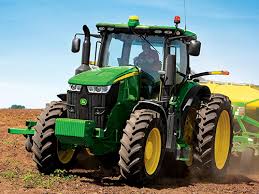Tractors are the backbone of modern farming, and their efficiency depends on the quality and reliability of the parts they use. Having the right agricultural tractor parts on hand is essential for every farmer to ensure smooth operations during peak farming seasons. In this article, we’ll discuss the must-have tractor parts that every farmer should keep in stock and how these parts contribute to maintaining a well-functioning tractor.
Why Farmers Need Essential Agricultural Tractor Parts
Farmers rely heavily on their tractors for various tasks, from plowing and planting to harvesting. A sudden breakdown can cause delays and reduce productivity. Having the necessary agricultural tractor parts readily available ensures:
- Quick Repairs: Minimize downtime by replacing damaged parts immediately.
- Cost Savings: Prevent costly repairs by addressing small issues early.
- Efficiency: Maintain consistent tractor performance.
Essential Agricultural Tractor Parts Every Farmer Should Have
Below is a list of essential parts that are commonly needed for repairs and maintenance:
| Part | Function | Why It’s Important |
|---|---|---|
| Engine Oil Filter | Keeps engine oil clean by trapping debris. | Prevents engine damage and ensures smooth operation. |
| Air Filter | Removes dust and dirt from incoming air. | Protects the engine and improves fuel efficiency. |
| Fuel Filter | Cleans impurities from fuel. | Prevents engine clogs and ensures smooth fuel flow. |
| Belts (Fan and Drive) | Drives engine components like alternators. | Essential for cooling, charging, and other functions. |
| Hydraulic Hoses | Transmits hydraulic fluid for power. | Ensures proper operation of attachments like loaders. |
| Battery | Provides power to start the tractor. | Crucial for ignition and powering electrical systems. |
| Tires | Support and grip for movement. | Required for stability and efficient traction in fields. |
Key Features to Look for When Buying Tractor Parts
When selecting agricultural tractor parts, consider the following:
1. Durability
Choose high-quality parts that can withstand heavy use and challenging field conditions. Cheap alternatives might save money initially but could fail sooner, costing more in the long run.
2. Compatibility
Ensure the parts match your tractor model. Using incompatible parts can lead to performance issues or damage.
3. Ease of Installation
Look for parts that are easy to install, especially if you prefer doing minor repairs yourself.
4. Warranty and Support
Opt for parts with a manufacturer’s warranty to guarantee reliability and protect your investment.
How to Store Agricultural Tractor Parts
Proper storage extends the life of your spare parts. Follow these tips to ensure your parts are in top condition when needed:
- Keep Them Dry: Moisture can cause rust and degrade parts. Store them in a dry location.
- Organize by Type: Use labeled shelves or bins to separate parts like filters, belts, and bolts for easy access.
- Regular Inspections: Check your inventory periodically to ensure parts are still in usable condition.
- Store Tires Properly: Keep tires off the ground to prevent flattening and protect them from sunlight.
Frequently Used Agricultural Tractor Parts
Farmers often encounter wear and tear on specific parts due to frequent use. Below is a breakdown of commonly replaced parts and their estimated replacement frequency:
| Part | Replacement Frequency |
|---|---|
| Engine Oil Filter | Every 100–200 hours of operation. |
| Air Filter | Every 500 hours or when clogged. |
| Belts | Inspect annually; replace if worn. |
| Tires | Replace when treads are worn out. |
| Hydraulic Hoses | Check every season for cracks or leaks. |
Benefits of Keeping Spare Parts
Having spare agricultural tractor parts on hand offers several benefits:
- Minimized Downtime: Quick replacements reduce delays during critical farming tasks.
- Improved Productivity: Keeps your tractor running smoothly, ensuring fieldwork progresses without interruptions.
- Reduced Stress: You’ll have peace of mind knowing you’re prepared for common tractor issues.
Tips for Maintaining Your Tractor
To reduce the need for frequent repairs and replacements, follow these maintenance tips:
- Regular Inspections: Check the engine, belts, filters, and tires for wear.
- Timely Oil Changes: Replace engine oil and oil filters as recommended in your tractor’s manual.
- Clean Air and Fuel Filters: Keep these filters clean to maintain efficiency and prevent damage.
- Proper Tire Care: Monitor tire pressure and ensure proper alignment to avoid uneven wear.
- Lubricate Moving Parts: Apply grease to hinges, joints, and other moving parts to prevent friction damage.
Where to Buy Agricultural Tractor Parts
Farmers have several options for purchasing parts:
- Local Dealers: Great for quick access to compatible parts.
- Online Stores: Convenient for finding specific parts and comparing prices.
- Manufacturer Stores: Reliable for original parts with warranties.
Before buying, ensure the vendor is trustworthy and offers quality products.
Conclusion
Having the right agricultural tractor parts is a game-changer for every farmer. By keeping essential spare parts on hand, you can avoid costly downtime and ensure your tractor remains in excellent condition. From engine filters and belts to tires and hydraulic hoses, each part plays a crucial role in maintaining efficiency and productivity.
By investing in high-quality, durable parts and practicing regular maintenance, you’ll not only save money but also extend the life of your tractor. A well-prepared farmer is a successful farmer, so stock up on these must-have tractor parts and stay ahead in your farming operations.
